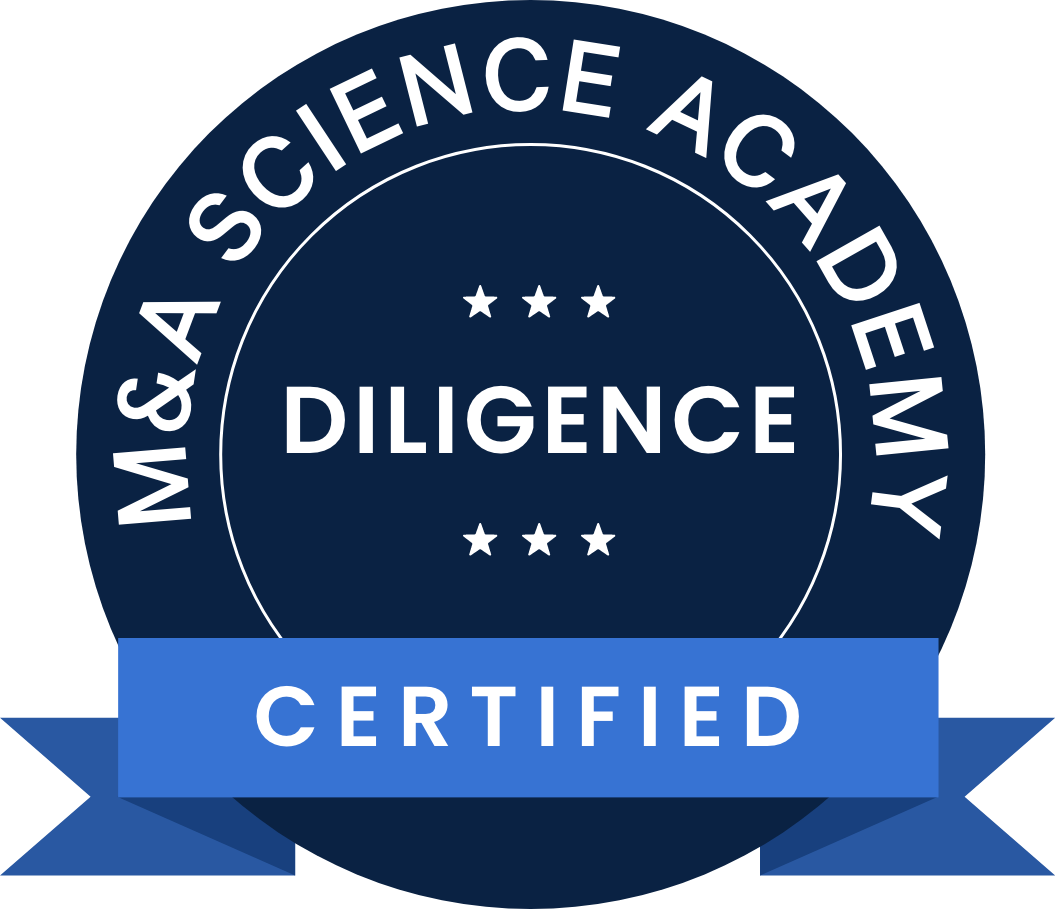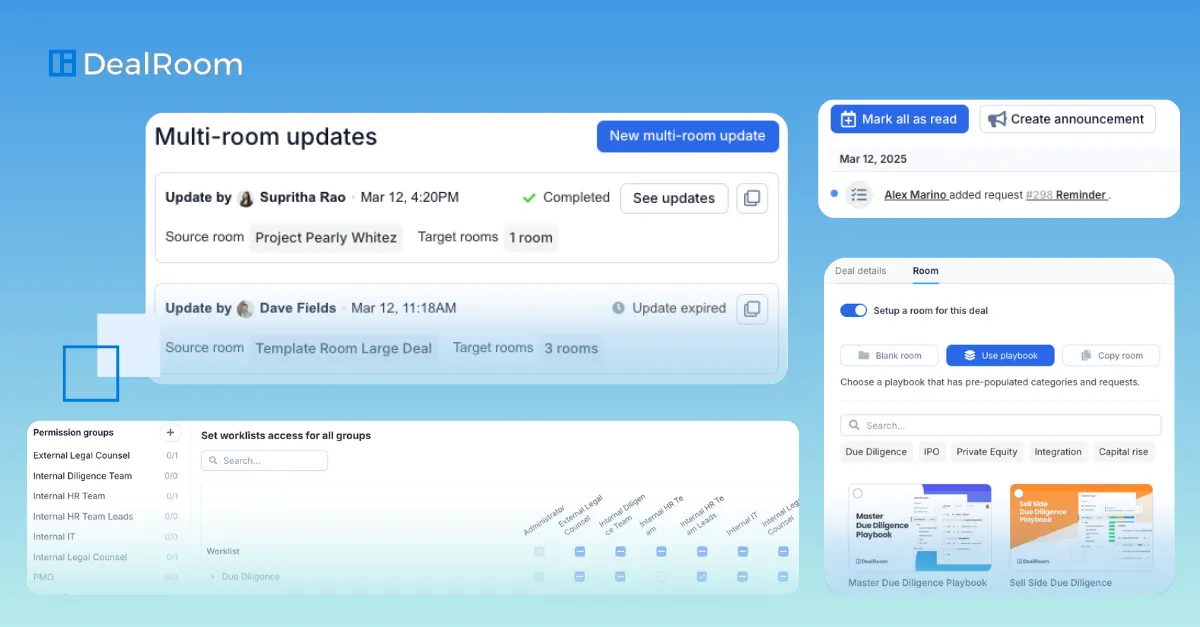What is management due diligence, and how does it differ from customary or traditional due diligence?
At DealRoom we help many companies organizing their due diligence process and in this article we'll answer this question.
What Is Management Due Diligence?
Management due diligence is the undertaking of evaluating a company’s senior management, essentially reviewing each senior manager’s effectiveness in adhering to and adding to a company’s strategic objectives.
Analyzing company management is essential when closing business transactions. It can essentially be the difference between a successful operation or one that fails.
Management due diligence also helps a company evaluate and understand how different groups within the organization perform their functions in relation to the company’s overall business goals.
Management due diligence also aids in defining the roles of the company’s employees and teams.
It is an informative process for people who are not directly connected to the organization, and the importance of due diligence management cannot be understated when evaluating a company as part of a business deal.
Management due diligence is a bit different than simply due diligence, as due diligence is researching and analyzing the company or organization as a whole, whereas management due diligence focuses specifically on the company or organization’s senior management.
Learn more about what is due diligence data rooms and how it benefits the due diligence process.
The Importance Of Management Due Diligence
When exploring “what is management due diligence,” know that it is important for a variety of different reasons.
Management due diligence can be enacted by not only the buyers of an organization, but the sellers as well.
Here are just a few of the reasons illustrating the importance of due diligence management:
- Evaluation Of Senior Leadership Team. Management due diligence evaluates the senior leadership team of a company. At the very least, this will ensure compatibility among senior leaders, roles and processes of both organizations. More importantly, it will help troubleshoot any potential issues that may arise.
- Ability To Reach Mutual Goals. Management due diligence evaluates the ability of integral team members to be able to reach common goals and objectives. It helps to ensure alignment with the overall strategy.
- Sets Expectations. By reviewing the senior stakeholders of the transaction, management due diligence sets a basis for expectations both at the team level and at an individual performance level. This can help asses and prevent possible issues from arising, and also identify any areas in which the senior leaders or managers may require additional training to perform most efficiently and reach the organization’s goals.
- Identifies Strengths And Areas To Build Upon. Due diligence management will identify an organization’s strengths, as well as areas they may need to improve upon to hit the business’s growth targets.

Types Of Transactions That Require Management Due Diligence
- Mergers Or Acquisitions
- Strategic Alliances
- Partnerships
- Joint Ventures
In general, the process should be performed anytime a company or organization plans on engaging in a significant transaction with another company or organization.
This could include buying or selling products or services, purchasing another company, or merging with another company.
Below are some examples of the types of transactions that require management due diligence:
- Mergers Or Acquisitions. Companies contemplating a merger or acquisition should most certainly consider performing due diligence. They need to evaluate and analyze the other company’s senior management team. You will also want to ensure that the teams of both companies will mesh well, and that important strategic goals are streamlined.
- Strategic Alliances. This process should also be undertaken for strategic alliances, for much of the same reasons as you would for a merger or acquisition. Undertaking management due diligence early on will save time, money and help prevent potentially unforeseen issues or problems in the long run.
- Partnerships. Partnerships are another reason to analyze the secondary company or organization and its senior leadership.
- Joint Ventures. Joint ventures should take the opportunity to analyze the other company’s team and organizational structures and processes. You want to ensure the company you are engaging in the joint venture with is compatible, has a management team that will work well with yours, and has an organizational structure which is sound.
There are so many different reasons, situations, and types of transactions that require this important process.
Before embarking on a large endeavor with another company or organization, make sure you do so with open eyes by learning as much as you can about the organization you are partnering with or acquiring!
Tips To Prepare For Management Due Diligence
To be effective and successful, management due diligence should be properly prepared for. Below are some tips to help:
- Always have clearly defined objectives and know exactly what findings you expect to see as the final work product.
- Establish a team for the evaluation process containing skilled, experienced team members.
- Establish the responsibilities, processes and timeline to ensure the project is performed efficiently and timely.
- Involve management from both organizations as soon as possible, as each organization must get to know the other’s leadership team. This is an essential step, as managers’ knowing each other as soon as possible will help them to more efficiently deal with later issues that may arise.
- Create a list of risks associated with each company or organization
- Create a due diligence checklist of all itemized information requests for all information that you need to finalize the process.
- Always sign a confidentiality agreement to protect sensitive data from anyone outside of the process. Then, agree on a secure method to store all sensitive information.
- Ensure you provide a comprehensive due diligence report of your analysis of the management team, including all potential strengths, areas for improvement, and risks so that the decision makers will be fully informed before deciding whether an agreement is to take place.

Typical Steps in Due Diligence Management Process
Although each of the transactions that require management due diligence can be slightly different, there are general steps that are typically followed throughout the process. Below are suggested steps to take when performing management process:
1. Online Assessment. Assess the team through online assessment questionnaires prior to meeting in person. These will generally include questions on personality and behavior that will enable productive conversations which will aid in the process. There are no “correct” or “incorrect” ways to respond, as they simply assess the personalities of the team members. These should not take more than 60-80 minutes to complete.
2. In Person Meetings. Meet with each relevant team member to get to know everyone personally and to talk about the team as a whole. Assess what each team member feels in terms of items the organization is doing well at vs areas they think could use improvement.
3. Analysis & Feedback. Analyze the responses of each team member and create an informative report for the stakeholders. Focus on creating actionable items, and more importantly, provide the investors with an accurate assessment of the strengths and challenges of the business.
4. Continuing Support. Provide continuing support on an as-needed basis. Help the organization post-transaction with any items they may need help with. This could include recruitment services, consulting services and optimizing the business plan to ensure optimal success.
The Takeaway
We hope this guide was informative and helpful, and provides you with a roadmap for success!
If you have additional questions, we’re more than happy to help! Please feel free to give us a call at 312-344-3442 or you may Contact Us by clicking the link below.




















.png)
.webp)



.webp)
.webp)
.webp)





.png)
.png)
.png)
.svg)

.svg)
.png)
